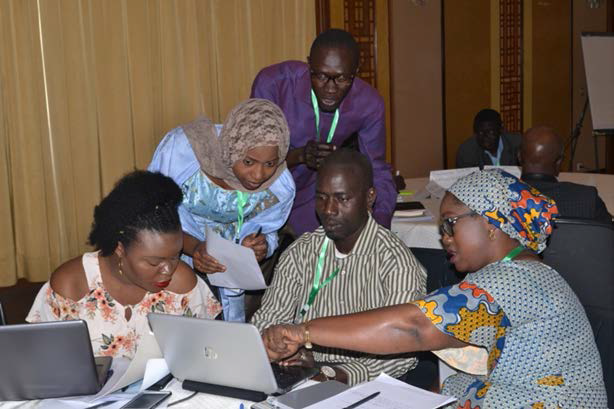Agriculture is a key sector of Senegal’s economy, accounting for an estimated two-thirds of its export revenues and serving as the basis for food and livelihood for 70% of the rural population. With the aim of assisting stakeholders to assess and improve their institutional architecture capacity and performance in a participatory manner, Africa Lead supported the Ministry of Agriculture’s Directorate for Statistical Analysis and Predications (DAPSA) to organize a three-day Institutional Architecture Assessment (IAA) workshop.
The workshop was held from 29 to 31 May 2018 at King Fahd Palace Hotel in Almadies. Sixty-one participants representing government, farmer organizations, private sector, donors, non-governmental organizations (NGOs), civil society organizations and research organizations attended the workshop. The workshop’s goals were to build a shared understanding of institutional architecture and its link to achieving the food security goals set forth in Senegal’s National Agriculture Investment Plan (NAIP) and National Food Security and Nutrition Plans (SAN), also known as the PNIASAN.
The workshop was centered on USAID’s Bureau of Food Security’s Institutional Architecture Diagnostic Tool, which provides a framework for analyzing a country’s capacity to undertake food security policy change by examining six components of the policy making process: the Guiding Policy Framework, Policy Development and Coordination, Inclusivity and Stakeholder Consultation, Evidence-based Analysis, Policy Implementation, and Mutual Accountability.
Senegal is the second country, after Kenya, to host this type of workshop as part of a pilot initiative that is testing the diagnostic tool to assist countries in sub-Saharan Africa to achieve goals outlined in their National Agriculture Investment Plans (NAIPs).
During the final sessions of the workshop, participants compiled an action plan listing recommendations and specific activities that will help the Institutional Architecture (IA) process in Senegal.
“The workshop has demonstrated that the achievement of the PNIASAN is not just the responsibility of a small group, it is multidimensional and it has to include the participation of the stakeholders at the grassroots level at every level of the process,” said Seynabou Diouf Mboup, the Focal Point for Food Security at the Ministry of Agriculture and Rural Equipment (MAER). “I think that from today there will be more ownership from everyone who was here and that this is just the beginning. We need to do follow up and develop the recommendations proposed,” she added.
Africa Lead will continue to support DAPSA and the various constituencies in implementing the recommendations and activities identified in the IA Plan of Action.
